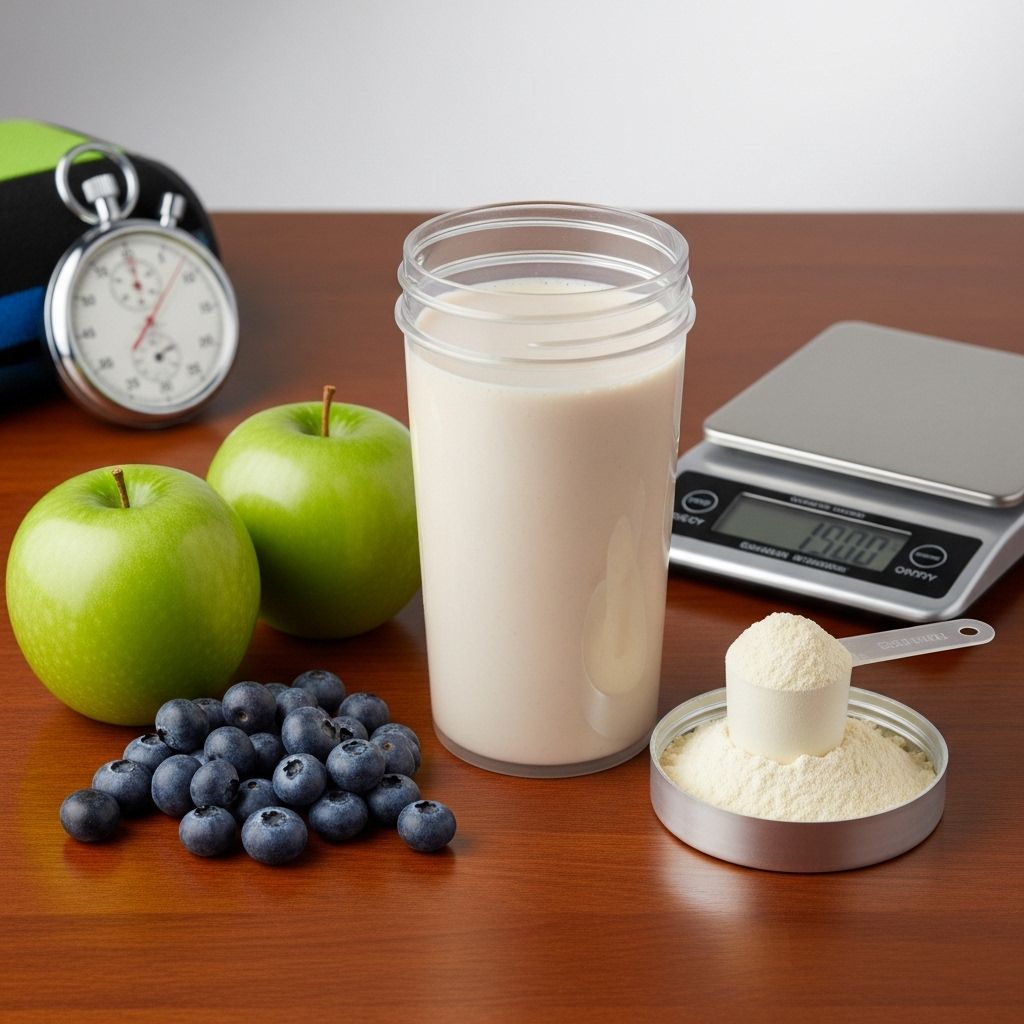How Many Protein Shakes Should You Drink Each Day?
Learn how to personalize your protein shake intake to best support your fitness, health, and nutritional goals without overdoing it.

Protein shakes are a popular supplement among athletes, fitness enthusiasts, and anyone looking to increase their protein intake for muscle building, weight management, or overall health. But with so many options available, one question remains at the forefront: How many protein shakes should you drink a day? This article presents expert insights, personalized recommendations, and practical advice about protein shakes, so you can optimize your nutrition without risk.
Why Protein Is Important for Your Health
Proteins are fundamental building blocks for every cell in the body, involved in muscle growth, tissue repair, and vital biochemical functions. A lack of sufficient protein can lead to muscle wasting, impaired immunity, and poor metabolic health, while excess can place strain on the kidneys or add unnecessary calories to your diet.
- Protein is crucial for muscle, skin, hair, bone, and organ health.
- It aids in tissue repair, growth, and enzyme production.
- Getting enough protein helps preserve muscle mass as you age.
- High-protein diets have been linked to better satiety and metabolic rate, but individual results vary.
How Much Protein Should You Aim for Daily?
Your ideal protein intake depends on several factors, including age, body weight, activity level, and overall health goals. Here is what experts recommend based on current research:
| Group | Recommended Daily Protein Intake |
|---|---|
| Sedentary Adult | 0.8 g/kg body weight (0.36 g/lb) |
| Active Adult / Muscle Building | 1.2–2.0 g/kg body weight (0.6–0.9 g/lb) |
| Older Adults | 1.0–1.2 g/kg body weight |
| Athletes | Up to 2.0 g/kg body weight |
For most adults, this translates to about 46 grams/day for women and 56 grams/day for men. However, highly active individuals, those aiming to gain muscle, and older adults may benefit from higher intake levels.
What Does This Mean in Terms of Food?
- 8 oz glass of milk: ~8 grams protein
- 1 cup Greek yogurt: ~11–16 grams protein
- 3 oz lean meat: ~21 grams protein
- 1 cup cooked beans: ~12–16 grams protein
Most people’s regular diet provides sufficient protein—making the need for supplemental shakes less urgent for the general population.
How Many Protein Shakes Should You Really Drink A Day?
Experts agree: Whole, nutrient-rich foods should always be your primary source of protein. After meeting your protein goals from food, you may choose to incorporate protein shakes for convenience or specific fitness goals. Here are the main takeaways:
- 1 protein shake per day is common and adequate for most people who wish to supplement their intake.
- Some individuals may consume up to 2 shakes per day, particularly those with higher protein needs, intense training regimens, or limited access to whole foods.
- Consuming more than 2 shakes daily is generally unnecessary and may increase your risk for digestive discomfort or nutrient imbalances.
- Listen to your body: Nutritional requirements vary from person to person and day to day, based on your activity level, muscle-building goals, age, and health status.
Registered dietitians recommend consulting with a nutrition professional to personalize your dietary plan if in doubt.
Should You Get All Your Protein from Shakes?
Experts strongly advise against relying solely on protein shakes for your daily protein needs. Here’s why:
- Whole foods provide more than just protein—they’re rich in vitamins, minerals, antioxidants, and fiber.
- A varied diet supports overall health and helps you absorb different nutrients essential for wellbeing.
- High reliance on shakes may mean missing out on nutrients like iron, magnesium, and healthy plant compounds found in whole foods.
Whole foods first, shakes second: Aim to meet most of your protein requirements from beans, lentils, lean meats, eggs, fish, nuts, seeds, and dairy. Use shakes as a convenient supplement, not a replacement.
Choosing the Right Protein Shake for You
Protein shakes vary widely in nutritional value, ingredient quality, and suitability for dietary needs. When selecting a shake, consider:
- No added sugar: Scan ingredient labels for unnecessary sweeteners.
- Type of protein: Whey, casein, egg, soy, pea, brown rice, hemp, and collagen are common sources.
- Allergen considerations: Choose plant-based proteins if you’re lactose intolerant, allergic to dairy, or following a vegan diet.
- Minimal additives: Fewer artificial flavors, colors, and preservatives are generally healthier.
- Serving size and calories: Be mindful of the caloric density per serving, especially if weight management is a goal.
Common Sources of Dietary Protein (Beyond Shakes)
- Legumes: Lentils, chickpeas, black beans
- Nuts and Seeds: Almonds, walnuts, pumpkin seeds, sunflower seeds
- Lean meats: Chicken breast, turkey, lean beef
- Fish and Seafood: Salmon, tuna, mackerel, sardines
- Dairy: Milk, cheese, yogurt
- Vegetarian options: Tofu, tempeh, seitan
Potential Risks of Too Many Protein Shakes
- Digestive issues: Excessive intake can lead to bloating, gas, or stomach cramps.
- Unnecessary calories: Some shakes are high in added sugars and fats that can contribute to weight gain.
- Nutrient imbalances: Too much protein can strain the kidneys or impact bone health if not balanced with other nutrients.
Rather than focusing on just the shakes, strive for balance in total dietary protein, calories, fiber, and micronutrient intake.
When Should You Drink Protein Shakes?
- After exercise: Protein intake post-workout may support muscle recovery and growth, but research shows no major difference in results whether you have a shake before or after working out.
- Before exercise: Can provide energy and may help reduce muscle breakdown, but may cause stomach discomfort in some individuals.
- Anytime: The most important factor is total protein intake throughout the day—not the timing.
Consistency matters more than timing. Aim to spread protein intake evenly throughout meals and snacks for best results.
Best Practices for Safe Protein Shake Consumption
- Consult a registered dietitian if you’re unsure about your protein needs or have specific health concerns.
- Choose shakes that fit your dietary preferences and any medical needs (vegan, dairy-free, low-sugar, etc.).
- Stay hydrated, especially if consuming more protein than usual.
- Monitor your body for digestive issues, appetite changes, or other health symptoms.
Frequently Asked Questions (FAQs)
Q: Is one protein shake enough for most people?
Yes. For most individuals, one shake per day is sufficient if supplements are desired. Whole foods are preferable as a primary source unless your doctor or dietitian advises otherwise.
Q: What happens if I drink three or more shakes a day?
Consuming more than two shakes daily is seldom needed and may cause digestive discomfort or excessive calorie intake. It’s more important to balance your diet overall than to rely on shakes.
Q: Can I replace meals with protein shakes?
Occasional meal replacement is acceptable, especially in busy lifestyles, but shakes lack the full nutrient profile of balanced meals. Relying on shakes long-term may lead to vitamin and mineral deficiencies.
Q: What type of protein shake is best for vegans?
Look for plant-based protein powders made from pea, soy, rice, hemp, or a blend of these. These options provide high-quality amino acids and typically avoid common allergens.
Q: Is it safe for older adults to drink protein shakes?
Yes, if shakes are used to help meet increased protein needs often recommended for older adults (1.0–1.2 g per kg body weight per day) and there are no contraindications, such as kidney disease. Whole food sources are still ideal, supplemented with shakes as needed.
Tips to Optimize Your Daily Protein Intake
- Incorporate a variety of protein-rich foods into your meals.
- Choose snacks like Greek yogurt, nuts, or hard-boiled eggs for a protein boost.
- Evaluate shake labels for protein type, quality, and absence of unnecessary additives or sugars.
- Aim for consistent protein intake spread over the day—don’t load all protein into a single meal or shake.
- Pair protein foods with high-fiber vegetables and whole grains to support digestion and overall health.
Conclusion: Strike a Healthy Balance
While one protein shake per day is suitable for most people, your personal needs may vary based on activity, age, and health goals. Make whole foods your first choice for protein, use shakes as a supplementary convenience when necessary, and tailor your nutrition plan with expert advice. By integrating balanced, nutrient-rich protein sources, you’ll support your fitness, strength, and long-term health with confidence.
References
- https://www.prevention.com/food-nutrition/healthy-eating/a63025603/how-many-protein-shakes-a-day/
- https://www.prevention.com/food-nutrition/a40180875/when-to-drink-protein-shake-before-or-after-workout/
- https://www.heart.org/en/healthy-living/healthy-eating/eat-smart/nutrition-basics/protein-and-heart-health
- https://www.health.harvard.edu/nutrition/when-it-comes-to-protein-how-much-is-too-much
- https://pmc.ncbi.nlm.nih.gov/articles/PMC10761008/
- https://pmc.ncbi.nlm.nih.gov/articles/PMC11022925/
- https://www.prevention.com/food-nutrition/healthy-eating/g23065278/high-protein-foods/
- https://www.mayoclinic.org/healthy-lifestyle/weight-loss/expert-answers/protein-shakes/faq-20058335
Read full bio of Sneha Tete












